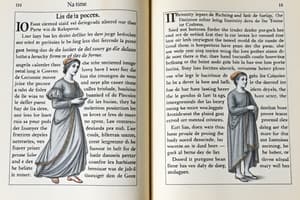Podcast
Questions and Answers
What was the main focus of medieval theory in relation to literature?
What was the main focus of medieval theory in relation to literature?
- To help individuals become better Christians (correct)
- To promote secular values
- To challenge the divine plan
- To preserve ancient texts
During which period did Scholasticism and Humanism coexist in medieval criticism?
During which period did Scholasticism and Humanism coexist in medieval criticism?
- 11th to 12th century
- 8th to 10th century
- 13th to 16th century (correct)
- 1st century BC to 7th century AD
What was the position of poetry in the Medieval Ages?
What was the position of poetry in the Medieval Ages?
- Considered a prophecy or revelation (correct)
- Not valued as much as philosophy
- Existed separately from theology and philosophy
- Purely for entertainment
What was a significant focus of medieval criticism?
What was a significant focus of medieval criticism?
What did the experience of mysticism involve according to the text?
What did the experience of mysticism involve according to the text?
Flashcards are hidden until you start studying
Study Notes
Medieval Literary Theory
- Focused on understanding literature through the lens of religious and philosophical concepts.
- Emphasized the moral and didactic purposes of literature.
- Sought to interpret texts in a way that aligned with religious beliefs and teachings.
Scholasticism and Humanism
- Coexisted during the late Middle Ages, particularly in the 14th and 15th centuries.
- Scholasticism emphasized logic and reason, while Humanism focused on the study of classical literature and human experience.
Poetry in the Medieval Ages
- Held a prominent position in medieval society.
- Used as a form of entertainment, education, and religious expression.
- Commonly employed in storytelling, historical narratives, and religious hymns.
Medieval Criticism
- Placed a great emphasis on the allegorical interpretation of literary texts.
- Sought to uncover hidden meanings and moral lessons embedded within stories.
- Often used biblical and theological references to interpret literary works.
Mysticism
- Involved the pursuit of direct communion with God or the divine.
- Emphasized the importance of spiritual experience and intuition.
- Often characterized by visions, revelations, and a sense of unity with the divine.
Studying That Suits You
Use AI to generate personalized quizzes and flashcards to suit your learning preferences.




